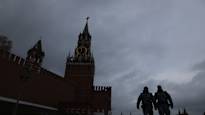The Russian economy is showing several classic signs of overheating. Its effects may be seen as early as next year, the British magazine The Economist estimates.
The Russian economy threatens to run into difficulties next year, British newspaper The Economist tells.
Most central banks are currently lowering their key interest rates to boost the economy. In Russia, the development is the opposite.
In Russia, the key interest rate already rose to 21 percent in October. By the end of the year, the interest rate is expected to rise to 23 percent.
For a country at war, such a high interest rate is exceptional, The Economist estimates.
Economic growth does not guarantee stability
Russia’s economy grew by 3.6 percent last year despite Western sanctions. The same pace is expected to continue this year.
According to Brittilehti, this may be a sign of future difficulties.
Next year, Russia will increase its defense spending by a quarter. When the budgets of defense and security and intelligence services are added together, next year it will make up more than 40 percent of Russia’s state expenses and correspond to almost a tenth of the country’s gross domestic product (GDP).
During the war, the country’s national debt has increased from 10 percent to 16 percent in relation to the country’s GDP, which indicates the disproportionality of the government’s income and expenses.
The unemployment rate in Russia is currently only 2.4 percent. Due to labor shortages in male-dominated fields and problems recruiting volunteer soldiers, the country has to hire soldiers from North Korea.
In the country, inflation has risen to eight percent. At the same time, the economy is showing several classic signs of overheating.
In the midst of severe inflation, tightening the taxation of citizens would be the president to Vladimir Putin unfavorable. That would likely anger a large portion of the public and contradict the Kremlin’s propaganda that the economy is doing well at the moment.
China is a dear friend
According to The Economist, Russia’s difficulties are deepened by its dependence on China.
Russia pays a heavy price for China’s services. At the same time, a third of Russia’s imports and 90 percent of the microelectronics needed by the country’s military industry come from China.
Next year, economic growth in Russia is expected to slow down. At the same time, high interest rates restrain the consumption of companies and citizens and reduce investments.
This year, corporate bankruptcies in Russia have increased by a fifth. Next year, the pace threatens to accelerate.
Putin may hope that the newly elected president of the United States Donald Trump redeem his promise and end the war quickly, the British newspaper estimated.
